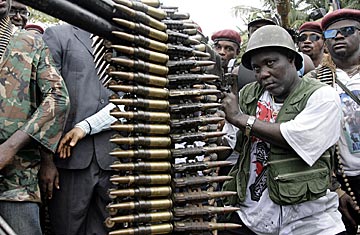
Members of a militant group examine an anti aircraft gun surrendered to the Nigerian authorities on October 3 in Port Harcourt. Around 5,000 militants handed in their weapons at a ceremony on the eve of the expiry of an amnesty extended to rebels
For a few brief weeks this autumn, there were hopes that the long-running civil war in the Niger Delta in southeastern Nigeria might finally be coming to an end. President Umaru Mousa Yar'Adua announced an amnesty deal for rebels and promised billions of dollars of investment in the poor but oil-rich delta, a 10% stake for the local population in the region's oil ventures and a small monthly stipend and re-training for ex-fighters. In return, thousands of militants declared a ceasefire and handed in their weapons, while their leaders initiated talks with the government on an eventual peace deal.
A solution looked possible because Nigeria's government was finally conceding that the rebels' demands — increased development and the environmental repair of the delta — were justified. "The militants are not asking for anything unusual or extraordinary," Defense Minister Godwin Abbe told TIME at his offices in the capital Abuja earlier this month. Just as significant, a petroleum industry bill was also introduced promising greater transparency in a notoriously opaque business — a sign the government was willing to crack down on the kind of corruption that has served Nigeria so badly, fueling unrest not only in the delta but the north of the country, as well.
Nigeria matters. As oil-rich nations from Russia to Venezuela to Iran become ever more nationalistic and tighten their supplies of fuel, more high-quality oil discoveries are being made off West Africa's coast, giving the world a (usually) reliable new source of oil. The U.S. already imports 16% of its oil from Africa, according to the U.S.-based Energy Information Administration, and wants to raise that to 25% in the future. Nigeria holds by far the biggest reserves in Africa and supplies 8 to 10% of all U.S. oil imports, according to the EIA. But in recent years, rebel attacks on oil targets — blowing up pipelines and kidnapping foreign oil workers — have cut Nigeria's production by as much as a third and regularly caused the world price of crude to spike. Peace in the delta would mean more reliable supplies of oil and cheaper prices at the pump.
As the New Year approaches, however, hopes for peace are evaporating fast, largely because of two factors. First, the main drivers in the government toward negotiating a truce with the rebels have been out of action for weeks. Yar'Adua, a chain smoker with chronic health problems, has been in Saudi Arabia for nearly a month receiving treatment for pericarditis, an inflammation around the heart. In addition, the President's special adviser on Niger Delta affairs, Timi Alaibe, the key middleman who brought the militants to the table, has been in London for his own medical treatment since early October. The absence of the two men has caused negotiations to stall just as the insurgency's leaders are under the most pressure from their rank-and-file members to deliver a final settlement. Now, Nigeria's notoriously corrupt bureaucrats are in charge of the peace process, and one rebel leader says that many are reverting to type. "They offered me an oil field to call off my boys," says the leader. "These guys aren't sincere. All they care about is getting oil production back up. They think they can just buy us off."
Disunity among the rebels is the second reason for pessimism. In the last few years, most of the militants have operated as part of a loose alliance called the Movement for the Emancipation of the Niger Delta (MEND), led by a former businessman named Henry Okah. Then, in September 2007, Okah was imprisoned on charges of treason, terrorism, illegal possession of firearms and arms trafficking. Since his release in July, he has fallen out with other guerrilla leaders.
The extent of the split became apparent this weekend. Following warnings by Okah that the peace process was faltering, MEND rebels launched a "warning strike" on Saturday, with 35 militants attacking a pipeline jointly owned by Royal Dutch Shell and Chevron with automatic weapons and rocket-propelled grenades. "While wishing the President a speedy recovery," said rebel spokesman Jomo Gbomo, "a situation where the future of the Niger Delta is tied to the health and well-being of one man is unacceptable." He added that the government has been telling foreign investors that the situation in the Niger Delta was under control — an assertion "far from the truth," he says. And he gave the government a deadline to improve its performance, saying the insurgents would "review" their ceasefire — a metaphor for stage another attack — on Jan. 19.
But within hours, Mack Anthony, commander of a MEND faction now opposed to Okah, condemned the attack. "We want to state categorically that the attack was carried out by enemies of the Niger Delta," said Anthony. "We are aware that the negotiation process is slow. [But] we are in an era of peace and MEND's top leaders shall not ... do anything that will derail the existing peace."
Such divisions can only harm the prospects for peace. Even more depressingly, the one thing on which Anthony and Okah seem to agree is that the future looks grim. In an interview with TIME this month, Anthony said he was "quite pessimistic" about the chances of forging a lasting peace because of the deteriorating health of the President — "I am categorically saying that [his] death may mean the death of Nigeria" — and because until the government tackles corruption, a peaceful and prosperous Nigeria will have to wait. "Unless the entire system is overhauled," he said, "we are going nowhere."
— With reporting by Gilbert da Costa / Abuja
